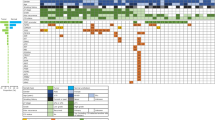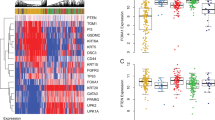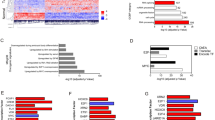Abstract
p73, a first p53 relative, was recently identified and shown to be monoallelically expressed in a number of different human tissues. To determine the potential role of this gene in human bladder cancer, we investigated p73 expression levels, allelic expression patterns, and analysed p73 mutations in 23 unselected primary invasive bladder cancers with matched normal tissues and in seven bladder cancer cell lines. In a comparison between normal and tumor tissues using quantitative RT – PCR analysis, we found that p73 was overexpressed in 22/23 bladder cancers, sometimes as great as 20-fold. Allelic expression analysis using a C/T polymorphism in exon 2 and a newly identified T/C polymorphism in exon 5 revealed that p73 was biallelically expressed in both normal bladder and cancer tissues, suggesting that p73 is not imprinted in bladder tissue. Mutation screening of the p73 gene in bladder cancer DNAs using denaturing high-performance liquid chromatography analysis and DNA sequencing revealed no tumor-specific mutations in any coding exons of the p73 gene. These data suggest that the p73 is unlikely to be a tumor suppressor gene, but that overexpression of p73 may contribute to tumorigenesis in bladder cancer.
This is a preview of subscription content, access via your institution
Access options
Subscribe to this journal
Receive 50 print issues and online access
$259.00 per year
only $5.18 per issue
Buy this article
- Purchase on Springer Link
- Instant access to full article PDF
Prices may be subject to local taxes which are calculated during checkout



Similar content being viewed by others

References
Cordon-Cardo C, Dalbagni G, Saez GT, Oliva MR, Zhang ZF, Rosai J, Reuter VE and Pellicer A. . 1994 Int. J. Cancer 56: 347–353.
Cordon-Cardo C and Reuter VE. . 1997 Semin. Diagn. Pathol. 14: 123–132.
Fujita J, Srivastava SK, Kraus MH, Rhim JS, Tronick SR and Aaronson SA. . 1985 Proc. Natl. Acad. Sci. USA 82: 3849–3853.
Goto K, Konomoto T, Hayashi K, Kinukawa N, Naito S, Kumazawa J and Tsuneyoshi M. . 1997 Mod. Pathol. 10: 428–437.
James CD, Carlbom E, Dumanski JP, Hansen M, Nordenskjold M, Collins VP and Cavenee WK. . 1988 Cancer Res. 48: 5546–5551.
Jost CA, Marin MC and Kaelin Jr WG. . 1997 Nature 389: 191–194.
Kaghad M, Bonnet H, Yang A, Creancier L, Biscan JC, Valent A, Minty A, Chalon P and Lelias JM. . 1997 Cell 90: 809–819.
Knowles MA, Elder PA, Williamson M, Cairns JP, Shaw ME and Law MG. . 1994 Cancer Res. 54: 531–538.
Liu W, Smith DI, Rechtzigel KJ, Thibodeau SN and James CD. . 1998 Nucleic. Acids Res. 26: 1396–1400.
Mai M, Yokomizo A, Qian C, Yang P, Tindall DJ, Smith DI and Liu W. . 1998a Cancer Res. 58: 2347–2349.
Mai M, Qian C, Yokomizo A, Tindall DJ, Bostwick GD, Polychronakos C, Smith DI and Liu W. . 1998b Oncogene 17: 1739–1749.
Mai M, Huang H, Reed C, Quan C, Smith JS, Alderete B, Jenkins R, Smith DI and Wanguo L. . 1998c Genomics 51: 359–363.
Miyazaki K, Funahashi K, Numata Y, Koshikawa N, Akaogi K, Kikkawa Y, Yasumitsu H and Umeda M. . 1993 J. Biol. Chem. 268: 14387–14393.
Naito S, Kotoh S, Koga H, Hasegawa S, Yamasaki T, Noma H and Kumazawa J. . 1996 Human Cell 9: 49–56.
Oefner PJ and Underhillo PA. . 1995 Am. J. Hum. Genet. 59: (Suppl) A266.
Parker SL, Tong T, Bolden S and Wingo PA. . 1996 CA Cancer J. Clin. 46: 5–27.
Reddy EP, Reynolds RK, Santos E and Barbacid MA. . 1982 Nature 300: 149–152.
Sarkis AS, Dalbagni G, Cordon-Cardo C, Zhang ZF, Sheinfeld J, Fair WR, Herr HW and Reuter VE. . 1993 J. Natl. Cancer Inst. 85: 53–59.
Takeda O, Homma C, Maseki N, Sakurai M, Kanda N, Schwab M, Nakamura Y and Kaneko Y. . 1994 Genes Chromos. Cancer 10: 30–39.
Tazaki H and Tachibana M. . 1988 Hum. Cell 1: 78–83.
Versteeg R, Caron H, Cheng NC, van der Drift P, Slater R, Westerveld A, Voute PA, Delattre O, Laureys G, Van Roy N and Speleman F. . 1995 Eur. J. Cancer 31: 538–541.
Yokomizo A, Tindall DJ, Drabkin H, Gemmill R, Franklin W, Yang P, Sugio K, Smith DI and Liu W. . 1998a Oncogene 17: 475–479.
Yokomizo A, Tindall DJ, Hartmann L, Jenkins RB, Smith DI and Liu W. . 1998b Int. J. Oncol. 13: 101–105.
Acknowledgements
This work was supported by NIH Grant CA48031 (to DIS) and by the Mayo Foundation. AY is supported by the Prostate Cancer Program at Mayo.
Author information
Authors and Affiliations
Rights and permissions
About this article
Cite this article
Yokomizo, A., Mai, M., Tindall, D. et al. Overexpression of the wild type p73 gene in human bladder cancer. Oncogene 18, 1629–1633 (1999). https://doi.org/10.1038/sj.onc.1202474
Received:
Revised:
Accepted:
Published:
Issue Date:
DOI: https://doi.org/10.1038/sj.onc.1202474
Keywords
This article is cited by
-
Silencing E3 Ubiqutin ligase ITCH as a potential therapy to enhance chemotherapy efficacy in p53 mutant neuroblastoma cells
Scientific Reports (2020)
-
C14orf166 is a high-risk biomarker for bladder cancer and promotes bladder cancer cell proliferation
Journal of Translational Medicine (2016)
-
Expression of p53 family genes in urinary bladder cancer: correlation with disease aggressiveness and recurrence
Tumor Biology (2014)
-
N-(phosphonacetyl)-L-aspartate induces TAp73-dependent apoptosis by modulating multiple Bcl-2 proteins: potential for cancer therapy
Oncogene (2013)
-
p73 G4C14-to-A4T14 polymorphisms are positively correlated with triple-negative breast cancer in southwestern China
Medical Oncology (2013)


